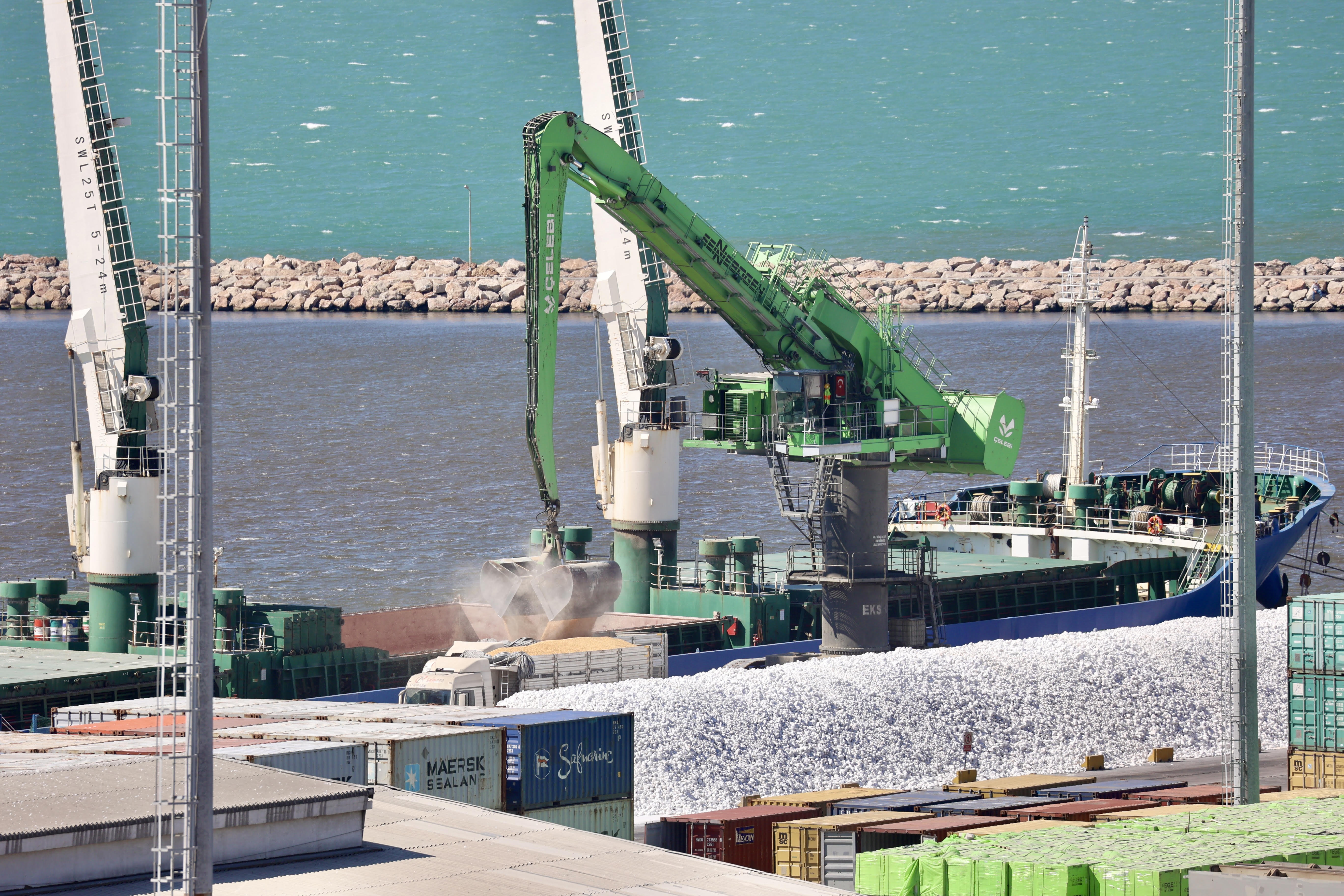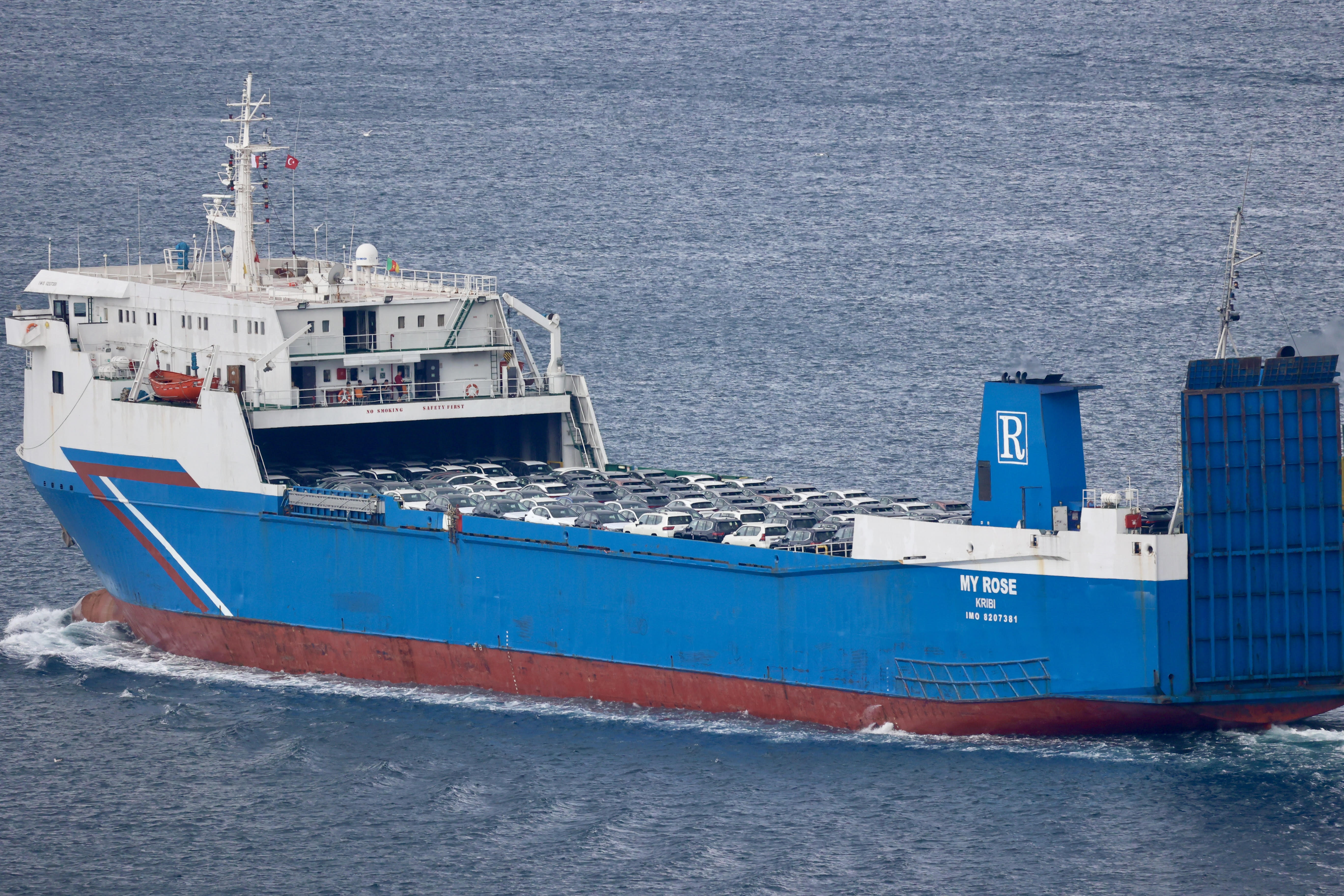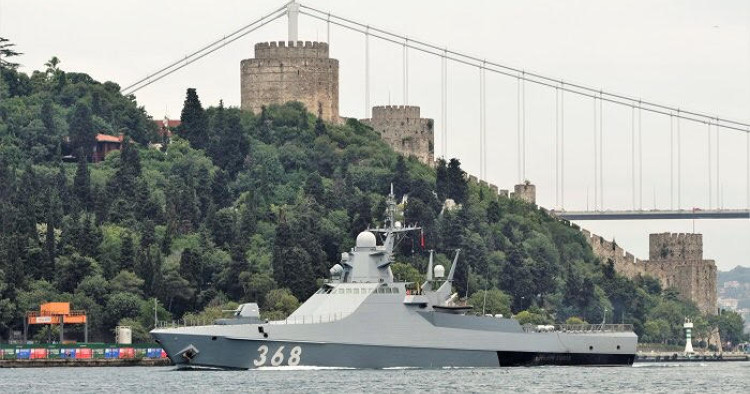So far, the Black Sea basin has not been seen as the highest-priority battleground in the ongoing Russo-Ukrainian war, but it is key to Russia’s economy and, by extension, its war effort. Russia earns a significant part of its income from commercial activities, both legitimate and illegitimate, that depend on unfettered access to the Black Sea. It is the main maritime route Russia uses to re-sell goods plundered from Ukraine, 100% of Russian grain is exported from its Azov and Black Sea ports, and it’s an important trade corridor by which European- and Chinese-manufactured goods reach Russia.
At present, Russia de facto dominates the Black Sea, conducting trade, looting Ukrainian assets, as well as exporting petroleum products and weapons beyond the region. In other words, it is allowed to carry out all manner of military and commercial endeavors in its own interest and essentially without restrictions, while interfering with other countries’ economic activities and impeding lawful freedom of navigation.
Russia’s malign behavior in the Black Sea includes piracy, plunder, petroleum price cap violations, and actions to prevent the free transit of foreign commercial and naval vessels. Its largely unchallenged position in the Black Sea also helps Russia maintain access to foreign-made products and components, circumventing sanctions. Some of these imported goods arriving at Russian Black Sea ports have dual military-civilian uses, which Moscow then employs in its war of aggression. The West and the broader international community have yet to act to decisively rein in these flagrant violations of international laws and norms.
Piracy
On Aug. 13, the Russian navy Black Sea Fleet’s Vasily Bykov, a large patrol boat from the 184th Novorossiysk Coastal Defense Brigade Patrol Ship Division, reportedly fired warning shots at the Palau-flagged merchant vessel Sukru Okan, in the Black Sea. According to the Russian Ministry of Defense, Sukru Okan did not respond to demands to stop so that it could be inspected for banned cargo, and so Russian service members discharged their firearms. In order to inspect the cargo ship, Vasily Bykov scrambled a Ka-29 helicopter carrying a group of Russian naval infantry. Following radio negotiations, the cargo ship slowed down, and the inspection team landed on its deck. No weapons were found.
Russia had no legal authority to board a foreign civilian vessel passing just outside Turkish and Bulgarian territorial waters and far from the Russian mainland. Indeed, boarding Sukru Okan in international waters was piracy, pure and simple, in gross violation of the United Nations Charter, the U.N. Convention on the Law of the Sea (UNCLOS), and other norms of international law. It happened because Moscow continues to act as if the entire Black Sea is a Russian lake, while the international community is failing to communicate that this is not the case.
Plunder
In addition to piracy, the Russian state and individuals close to the Kremlin are engaged in an industrial level of theft of Ukraine’s national assets and natural resources from the occupied territories. Since the beginning of its initial invasion of Ukraine in 2014, Russia has seized dozens of Ukrainian factories, refineries, offshore hydrocarbon drilling platforms, naval and merchant ships, and even scrap metal. Russia also plunders coal from occupied Donbas, which to this day is being marketed in the region and beyond.
The occupation of tens of thousands of additional square miles of Ukrainian territory since February 2022 has enabled Russia and its state enterprises to plunder millions of tons of Ukrainian agricultural commodities via sophisticated smuggling operations that make use of falsified manifests and seaborne subterfuge.
Although Russia’s grain theft has been exposed, it has not been stopped. To the contrary, the operation is growing bigger and better organized. Moscow is adding new port facilities to load pillaged grain as well as setting up new export routes. Agricultural commodities stolen from Ukraine are being exported faster, to more destinations, including to customers in the wider Mediterranean region and the Middle East. Stolen grain is also taken to Rostov-on-Don, where it is mixed with domestically produced Russian yields and, from there, sold or donated to the rest of the world. The free grain that Russia promised to African nations at last July’s St. Petersburg summit will likely, at least in part, include plundered Ukrainian harvests.
Moreover, the theft is happening more and more out in the open. For example, last year, stolen grain from Ukraine was only being forwarded to Syria and Turkey, but this year, shipments from occupied Sevastopol’s Avlita grain terminal have been tracked going directly to Bandar Khomeini, Iran, via the Suez Canal. In 2023, observers also started to see direct coal exports from the unlawfully annexed Donbas territories of Ukraine — so-called Luhansk and Donetsk People’s Republics (LPR, DPR) — to regional countries.

Russian bad faith on the grain deal
Two months ago, Moscow unilaterally left the United Nations-brokered Ukrainian grain export deal — which Ankara helped negotiate a year earlier — over claims that the West was hindering its trade in agricultural commodities. The original arrangement was envisioned as a workaround to Russia’s blockade of Ukrainian seaports and, as such, attempted to remedy a situation that Russia itself created and continues to exploit to its advantage, abusing the good offices of the U.N. and Turkey and flagrantly violating international norms, precedents, and laws. Moscow promotes the false narrative that its blockade prevents weapons transfers to Ukraine via the Black Sea; yet to date, no bulk vessel has been found to be transporting weapons, nor has Russia provided any credible evidence that such an event ever occurred. And Russian claims for why it scuttled the agreement are equally insincere. In fact, Russia exported about 6 million tons of grain in the first two months of this year’s harvest period, three times as much as in the same period last year. It is projected to see total yields of around 130 million tons of grain before the end of this harvest year.
Now under reconsideration, the U.N. grain export deal must be viewed in the context of Russia’s all-out assault on world food supplies and earlier efforts to sabotage the original agreement. Taken as a whole, Russia’s actions reveal its intentions to manipulate the commodities market and destabilize the international political climate by removing one of its biggest competitors in the agricultural sector, thereby pricing vulnerable consumers in the Global South out of the market and forcing them to become reliant on Russian goodwill and assistance. Namely, it has sought to shut down Ukraine’s Black Sea ports via naval blockades, mining operations, and standoff drone or missile attacks; and it has employed piracy tactics to harass vessels attempting to use Ukraine’s (lower-capacity) Danube ports — while also bombing the latter. At the same time, Moscow has adopted internal policies to artificially inflate the price of grain: Russia’s Ministry of Agriculture established a high price floor for Russian grain domestically. But the strategy has started to backfire. Because its wheat is overpriced, Russia has repeatedly lost out to competition from Central and Eastern Europe, recently failing to secure two huge Egyptian wheat contracts (GASC), which went to European suppliers. Now, even higher-quality French wheat is about $11 cheaper per bushel than what Russia can offer.
On Sept. 5, Turkish President Recep Tayyip Erdoğan was in Sochi to meet with his Russian counterpart, Vladimir Putin, to inter alia once more try to convince the Kremlin leader to return to the U.N. grain deal; but publicly, Putin demurred. Whether or not the deal can be resurrected, it is clear that Russia’s naval blockade is over. When Russia was forced to abandon Snake Island, located 20 miles off Ukraine’s southwestern coast, and lost numerous sailors and important naval assets, including the Black Sea Fleet flagship Moskva, to Ukrainian standoff attacks, the Russian navy withdrew to the eastern Black Sea, thus losing the ability to implement a durable blockade. Therefore, even if Moscow refuses to return to the U.N. grain deal, the West need not offer additional concessions. The Ukrainian humanitarian corridor for commercial grain carriers, which Kyiv announced last month, is working. For most of their journey, those vessels are transiting the territorial waters of North Atlantic Treaty Organization (NATO) members Turkey, Romania, and Bulgaria, under the watchful eye of Alliance aerial surveillance craft; and with sufficient political will, this corridor could be further protected with naval assets. In contrast, any financial deals offered to Russia would reward its illegal behavior, give the Kremlin a propaganda advantage, and finance Russia’s continued war effort against its neighbor.
Petroleum products
The Black Sea is vital to Russia’s ability to export its Urals blend of crude oil. At the beginning of August, the price of this blend passed the $60 price cap, above which Western governments have pledged to sanction companies assisting in the transport or other servicing of the Russian oil. To evade those Western sanctions and price caps, Russia has created a ghost fleet of tankers transferred from state- or privately owned companies to new business entities and flying flags of convenience. The vessels involved carry crude and petroleum derivatives out of the Black Sea, either to international locations like the Laconian Gulf in Greece, where ship-to-ship transfers take place, or to other countries such as India, where the crude is refined at Russian-owned facilities and then re-exported to the European Union.
Imports of international goods
Russia also depends on the Black Sea, especially the port of Novorossiysk, to import European- and Asian-manufactured cars, such as brand new Chinese electric vehicles, along with various other consumer and industrial goods. Moreover, a growing number of second-hand cars from Europe is imported to Russia via Georgian seaports like Poti. Some of the products and components shipped via the Black Sea may have civilian-military dual use — for example, the microchips contained in so-called “white goods” (major home appliances, such as refrigerators and washing machines).

Ukraine leads the way in the Black Sea
While the international community fails to assertively stand up to Russia’s aggressive behavior and sanctions busting in the Black Sea, Ukraine is single-handedly rewriting naval history — even without a navy of its own — notably by employing small, unmanned boats to cause significant damage to the well-established Russian fleet.
Whereas Russian harassment of random merchant vessels advances no military objective, Ukraine’s successful Aug. 4 targeting of the Russian-flagged tanker Sig, near Kerch, served a vital military interest. Sig is technically a merchant vessel but in practice functions as a Russian navy auxiliary ship and was sanctioned by the United States Treasury. When it was hit by Ukrainian naval drones, the ship was transporting kerosene jet fuel to the Russian air force in Syria, from the Feodosia oil terminal in occupied Crimea. Thus, as well as depriving a source of income to the local Russian occupying authorities on the Crimean Peninsula, the attack also complicated the logistics needed to maintain Russia’s military operation in the Syrian theater.
Second, Ukraine has successfully demonstrated that Russia does not dominate the sea when challenged and that shipping to Ukrainian seaports can be resumed. After the termination of the grain export deal, Ukraine announced a humanitarian corridor in the Black Sea to release cargo ships trapped in its ports; two vessels subsequently left the port of Odesa, which was allegedly being blocked by Russia. The Hong Kong-flagged container ship Joseph Schulte and cargo vessel Primus, carrying Ukrainian steel products, set a course through the shallow territorial waters of Romania, Bulgaria, and Turkey and, within days, successfully reached Istanbul. The coastal route is not the most optimal because of its limited depth, but it works. Combined with a secondary corridor for vessels that have drafts of more than 12 meters, it provides a vital means for Ukraine to trade freely with the world.
Russia’s pirate-like harassment of merchant ships that hoist flags of convenience and lack strong diplomatic backing is thoroughly complicated by the new reality of its naval vessels coming under physical threat when they show up in the northwestern Black Sea. Furthermore, as Ukraine has repeatedly shown to the world, Russia lacks even the ability to protect its two main Black Sea ports. Ukrainian attacks on the naval bases in Sevastopol and Novorossiysk this year have demonstrated the ingenious use of new technologies to cause significant damage to Russian naval assets, and they have proven that Russia’s critical oil infrastructure on the eastern Black Sea coast is within Kyiv’s reach.
International support for Ukraine is growing
International support for Ukraine outside of the West is growing, especially in the Middle East. Saudi Arabia organized a Ukraine peace summit in Jeddah Aug. 5-6, at which the U.S., European states, Turkey, Brazil, China, and India all expressed their support for protecting the U.N. Charter and the principles of territorial integrity and sovereignty. The Ukrainian media viewed the talks in Jeddah as preparation for a Global Peace Summit, planned to be held by the end of 2023, a sentiment also explicitly articulated by Andriy Yermak, the head of President Volodymyr Zelenskyy’s office. Additionally, the state-run news agency Ukrinform quoted Yermak’s deputy, Ihor Zhovkva, who explained the choice of venue: “The main thing is that we are holding the meeting in the Middle East, which completely ruins Russia’s narrative that Ukraine is only supported by the collective West […] the Arab world makes clear they will be looking for peace in Ukraine without Russia, and there will be no efforts to save someone’s face any longer.” Powerful Middle Eastern countries, namely from the Arabian Peninsula, are committing themselves to help ensure the delivery of Ukrainian agricultural commodities to needy customers in the Global South.
Conclusion
Russia is enriching itself by openly flouting a whole host of international laws, treaties, rules, and norms, at the expense of vulnerable populations in the Middle East, North Africa, and beyond. The international community has been far too hesitant to challenge this, and that leniency has encouraged or enabled Russian piracy, plunder, illegal blockading of Ukrainian ports, as well as interference in other countries’ economic activities in the Black Sea region — not to mention helping to keep parts of Georgia under Russian occupation. Meanwhile, Russian ships freely navigate the Black Sea and regularly transit the Turkish Straits to reach destinations around the globe. Russia’s vessels are almost never boarded, despite ample proof that they often carry stolen goods or are used to transport weapons and materiel despite ostensibly identifying themselves as civilian craft.
The Black Sea is currently at the center of lucrative Russian commercial activities needed to sustain its aggression in Ukraine. But this network is vulnerable, should a few carefully chosen targets be targeted and crippled by the Ukrainian military.
Yörük Işık is a geopolitical analyst based in Istanbul, where he runs the Bosphorus Observer, a consultancy analyzing maritime activity on the Turkish Straits. He is also a non-resident scholar with MEI’s Turkey Program.
Main photo courtesy of the author.
The Middle East Institute (MEI) is an independent, non-partisan, non-for-profit, educational organization. It does not engage in advocacy and its scholars’ opinions are their own. MEI welcomes financial donations, but retains sole editorial control over its work and its publications reflect only the authors’ views. For a listing of MEI donors, please click here.













